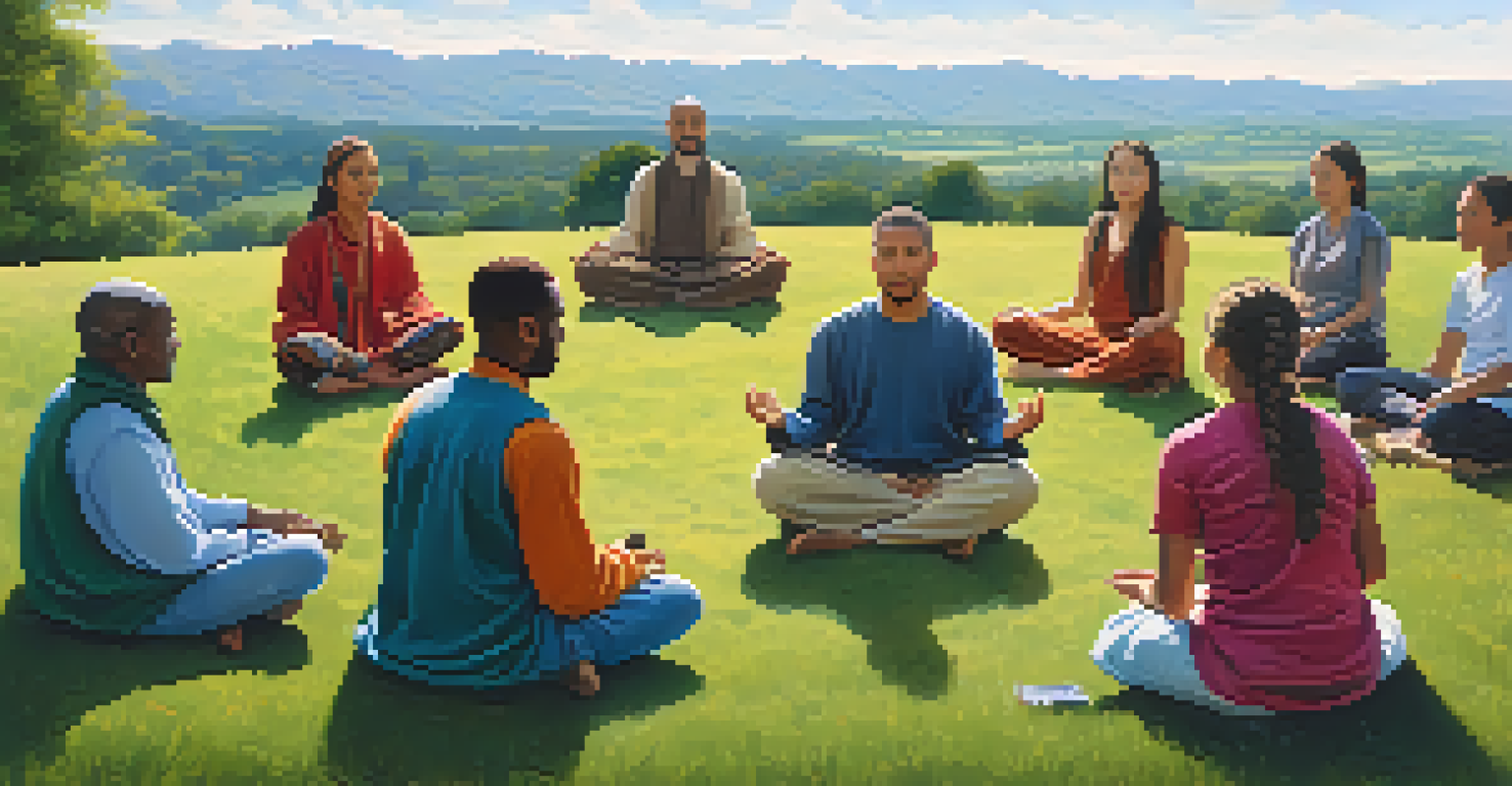Exploring Spirituality's Role in Shaping Personal Identity Today

Understanding Spirituality: Beyond Religion and Beliefs
Spirituality often conjures images of religious practices or dogmas, but it extends far beyond these confines. It encompasses a broader quest for meaning, connection, and understanding of oneself and the universe. For many, it’s about exploring personal beliefs, values, and experiences that resonate deeply within them.
Spirituality is not a religion, but a way of life.
In today's fast-paced world, spirituality offers a refuge—a space to reflect and find inner peace. This journey of self-discovery can include mindfulness, meditation, or simply spending time in nature. Each person’s path to spirituality is unique, shaped by their life experiences and individual perspectives.
Ultimately, spirituality is about fostering a sense of belonging and purpose. Whether one identifies with a particular faith or embraces a more eclectic approach, the essence lies in the journey toward self-awareness and authentic living.
The Intersection of Spirituality and Personal Identity
Personal identity is a tapestry woven from various threads including culture, experiences, and beliefs. Spirituality plays a crucial role in this process, often serving as a guiding compass for individuals navigating life's challenges. It can influence how we perceive ourselves and how we relate to others.

Many find that their spiritual beliefs help define their values and priorities. For instance, someone who values compassion may strive to embody this in their interactions, shaping their identity as a caring individual. This alignment between spirituality and personal values can create a strong sense of self.
Spirituality Beyond Religion
Spirituality encompasses a broader quest for meaning and connection, extending beyond traditional religious practices.
Furthermore, spirituality can foster resilience, giving individuals the strength to overcome adversity. By connecting with something greater than themselves, people often find the courage to embrace their true identities and the changes that come with personal growth.
How Modern Life Influences Spiritual Practices
In the hustle and bustle of modern life, many individuals are seeking ways to integrate spirituality into their daily routines. With the rise of technology and social media, spiritual practices have become more accessible. Online communities and resources allow people to explore spirituality in ways that resonate with their lifestyles.
The greatest gift you can give yourself is a little bit of your own attention.
Social media platforms, for example, can serve as spaces for sharing experiences and ideas about spirituality. This connectivity can help individuals feel less isolated in their spiritual journeys and foster a sense of community. It’s not uncommon to find discussions about mindfulness, meditation, or personal growth flourishing online.
However, this digital landscape can also bring challenges, such as overwhelming amounts of information or conflicting beliefs. It’s essential for individuals to discern what resonates with them personally and to curate their spiritual experiences in a way that feels authentic.
The Role of Mindfulness in Personal Development
Mindfulness has emerged as a popular spiritual practice that encourages present-moment awareness. This practice helps individuals connect with their thoughts, feelings, and surroundings, leading to a deeper understanding of themselves. By being mindful, people can cultivate a sense of peace and clarity within their busy lives.
Engaging in mindfulness can also promote emotional regulation and resilience. For instance, someone who practices mindfulness may find it easier to navigate stressful situations with a calm demeanor. This can lead to a stronger sense of identity as they learn to respond rather than react to life’s challenges.
Mindfulness Enhances Self-Identity
Practicing mindfulness fosters emotional regulation and self-compassion, contributing to a stronger personal identity.
Additionally, mindfulness can enhance self-compassion, allowing individuals to embrace their imperfections and acknowledge their growth. This acceptance plays a vital role in shaping a positive personal identity, enabling people to celebrate their unique journeys.
Spirituality as a Source of Community and Connection
Spirituality often fosters a sense of community, bringing individuals together around shared values and beliefs. Whether through formal religious gatherings or informal meet-ups centered on spiritual discussions, these connections can profoundly impact personal identity. They provide support, encouragement, and a sense of belonging.
For many, participating in spiritual communities helps reinforce their beliefs and values. Engaging with others who share similar spiritual journeys can create a nurturing environment that encourages personal growth. These communal experiences serve as reminders that no one is alone in their quest for meaning.
Moreover, the relationships formed in these communities can lead to lasting friendships and shared experiences that enrich personal identities. Together, individuals can explore their spirituality, celebrate milestones, and navigate challenges, creating a vibrant tapestry of interconnected lives.
Navigating Spirituality in a Diverse World
In our increasingly diverse world, spirituality often intersects with various cultural backgrounds and beliefs. This diversity enriches the spiritual landscape, providing opportunities for learning and growth. Embracing different perspectives can help individuals broaden their understanding of spirituality and its role in shaping identity.
For instance, someone may find inspiration in practices from different cultures, integrating them into their spiritual journey. This exploration can lead to a more profound appreciation of diversity and the rich tapestry of human experience. It encourages open-mindedness and respect for others’ beliefs.
Community Strengthens Spirituality
Engaging with spiritual communities provides support and reinforces shared values, enriching personal identity and growth.
Navigating spirituality in this context requires a willingness to listen and learn. By engaging with different spiritual traditions, individuals can expand their horizons and cultivate a more inclusive and understanding personal identity.
The Future of Spirituality and Personal Identity
As we look to the future, the role of spirituality in shaping personal identity is likely to evolve. With ongoing changes in societal values and the impact of technology, new forms of spirituality may emerge. These developments could lead to innovative practices and beliefs that resonate with future generations.
Younger generations are already exploring spirituality in ways that differ from traditional approaches. Many are seeking personalized paths that reflect their unique experiences and values. This shift highlights the importance of adaptability in spiritual practices and how they can align with individual identities.

Ultimately, the future of spirituality will likely be characterized by a fusion of traditional wisdom and contemporary understanding. This evolution can empower individuals to craft their spiritual journeys, fostering a deeper connection to themselves and the world around them.